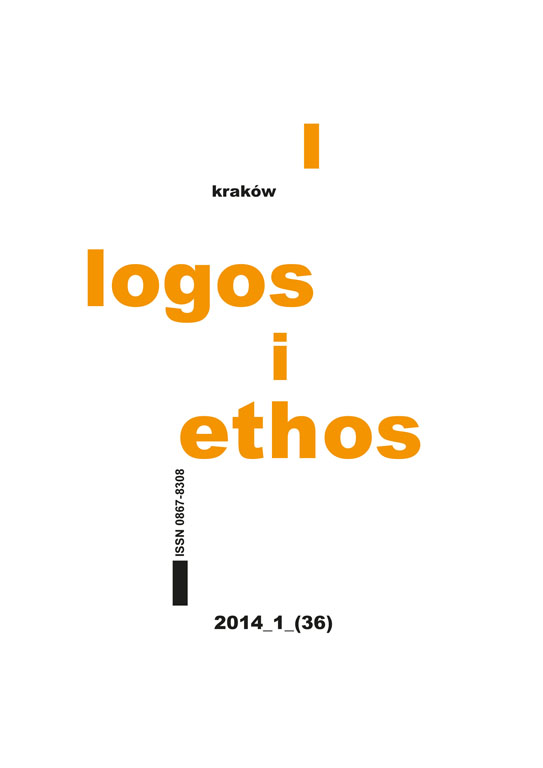Przeciw melancholii, czyli spór Agaty Bielik-Robson z Giorgiem Agambenem a perspektywy witalizmu mesjańskiego
DOI:
https://doi.org/10.15633/lie.30Słowa kluczowe:
Agata Bielik-Robson, Giorgio Agamben, potentiality, facticity, messianic vitalismAbstrakt
In the text Agamben’s theoretical project serves as a negative point of reference for the messianic vitalism of Agata Bielik-Robson. The aim is to indicate a tension characteristic of the “dynamic anthropology”, which could be equal to a subtle dialectics of strength and fragility, necessity and potency treated as “moments” of human being. Viewed from this perspective, Agamben’s narration seems melancholic because of its tendency to celebrate pure potentiality with a resentment towards facticity. It conceals the gnostic angst of occupying any position. As a consequence nuda vita genuinly becomes vulnerable to the sovereign power and the domination of death. Messianic vitalism not only avoids such downsides, but also is able to use them to its advantage, since it is at the same time a foundation of a concrete civilisation project and – which is more expressed in my article – a lynchpin of a sublime art of living.
Bibliografia
Adorno T. W., Dialektyka negatywna, tłum. K. Krzemieniowa, Warszawa 1986.
Agamben G., Co zostaje z Auschwitz: archiwum i świadek, tłum. S. Królak, Warszawa 2008.
Agamben G., „Homo sacer”. Suwerenna władza i nagie życie, tłum. M. Salwa, Warszawa 2008.
Agamben G., Profanacje, tłum. M. Kwaterko, Warszawa 2006.
Agamben G., Wspólnota, która nadchodzi, tłum. S. Królak, Warszawa 2008.
Bałus W., „Mundus melancholicus”: melancholiczny świat w zwierciadle sztuki, Kraków 1996.
Bielik-Robson A., Erros. Mesjański witalizm i filozofia, Kraków 2012.
Bielik-Robson A., Romantyzm. Niedokończony projekt. Eseje, Kraków 2008.
Bieńczyk M., Melancholia. O tych, co nigdy nie odnajdą straty, Warszawa 1998.
Hervás A. G., La gloria y el concepto de lo político en Giorgio Agamben, „Revista de Estudios Sociales”, 2010, nr 35.
Hotam Y., Gnosis and Modernity – a Postwar German Intellectual Debate on Secularisation, Religion and ‘Overcoming’ the Past „Totalitarian Movements and Political Religions”, R. VIII, 2004, nr 3–4.
Jonas H., Idea Boga po Auschwitz, tłum. G. Sowiński, Kraków 2003.
Kierkegaard S., O różnicy między geniuszem i apostołem, [w:] S. Kierkegaard, Pisma mniejsze, tłum. K. Toeplitz, Toruń 2007.
Klibansky R., Panofsky E., Saxl F., Saturn i melancholia. Studia z historii, filozofii, przyrody, medycyny, religii oraz sztuki, tłum. A. Kryczyńska, Kraków 2009.
Mesnard P., The Political Philosophy of Giorgio Agamben: A Critical Evaluation, „Totalitarian Movements and Political Religions”, R. V, 2004, nr 1.
Pobrania
Opublikowane
Numer
Dział
Licencja
Prawa autorskie (c) 2014 Rafał Zawisza

Utwór dostępny jest na licencji Creative Commons Uznanie autorstwa 4.0 Międzynarodowe.
Autorzy publikujący w czasopiśmie udzielają jego wydawcy zgody o następującej treści:
- Autor zachowuje autorskie prawa majątkowe do utworu, a jednocześnie udziela wydawcy czasopisma zgody na jego pierwszą publikację w wersji drukowanej i wersji online na licencji Creative Commons Uznanie autorstwa 4.0 Międzynarodowe oraz zgody na wykonywanie opracowań, w tym przekładów.
- Autor ma możliwość udzielania zgody niewyłącznej na opublikowanie utworu w wersji, która ukazała się w czasopiśmie (np. zamieszczenia go w repozytorium instytucjonalnym lub opublikowania w książce), wraz z informacją o jego pierwszej publikacji w czasopiśmie.
- Autor może umieścić swój utwór online (np. w repozytorium instytucjonalnym lub na swojej stronie internetowej) jeszcze przed zgłoszeniem utworu do czasopisma.

